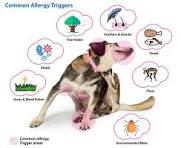From our publisher Trina Becksted
It’s not just us suffering during allergy season. Our pets are closer to the ground. Most have large floppy and not-so-floppy ears, that collect pollens. We must keep our doggies away from the stamens of weeds. These are what produce these harmful pollens that cause allergic reactions. Thanks for reading!
Hey there, pet lovers! 🐾
Did you know? Allergy season isn’t just a human thing—it affects our adorable furry friends too! That’s why we're sharing some valuable insights from South Meadow Animal Clinic.
From sneezy pups to sniffly kitties, it’s important to keep an eye out for those telltale signs and symptoms during this time of year. Let’s make sure our little buddies stay happy and healthy through allergy season! - Your pals at HHN
Signs and Symptoms of Allergies in Pets
Cats and dogs can develop allergy reactions that are comparable to those experienced by humans. As a result of allergies, pets may experience respiratory symptoms such as wheezing and coughing, as well as inflammatory symptoms like red eyes, watery eyes, sneezing, and a runny nose. They are, however, more commonly affected by the following allergy symptoms:
- Frequent ear and/or skin infections
- Itchy skin (frequent biting, licking, scratching, or rubbing)
- Hair loss
- Hot spots
- Hives and other rashes
- Dry, flaky skin
- Red or swollen-looking skin
- Scooting
- Vomiting and/or diarrhea

Diagnosing Pet Allergies
The first step in treating a pet's allergies is to figure out what kind of allergies they have. Seasonality can sometimes be a sign of allergies in the environment. When it comes to environmental exposures and food choices, diagnosing a pet's allergies may take a process of elimination.
Allergy Testing for Pets
A blood test or a skin test can be used to check for environmental allergies and sensitivities in pets. However, immunotherapy is advised in more severe situations when allergen avoidance and other treatments have failed, this testing is routinely done.
Treatments for Pet Allergies
Medicated baths, topical ointments, and antihistamine drugs provide symptomatic relief for most pets with allergies. This could include feeding your pet a special food, making changes to your pet's environment to reduce exposure to allergens, or starting immunotherapy Some things that we can do simply at home include brushing your pets daily, washing their paws after each walk, and keeping them away from flowering grasses and plant where stamens are present.
 Holistic Alternatives and Natural Supplement Options
Holistic Alternatives and Natural Supplement Options
Nutraceuticals (holistic and natural supplements) are offered over the counter since they are typically regarded as safe and produce little negative effects. Supplements for Hips and Joints Arthritis pills for dogs are one of the most popular pet supplements. They can be used to both prevent and treat hip and joint problems.
CBD Oil
Pet owners across the world utilize full-spectrum cannabidiol products to treat a variety of ailments, from boosting general health and preventing arthritis pain to treating allergies and offering respite to cancer sufferers. CBD oils, CBD treats, and CBD edibles are now available for pets.
Probiotics, which are available over the counter and have a variety of health advantages, are becoming increasingly popular with pet owners. Probiotics for pets aid with intestinal health, immune system boosting, allergy relief, and mood improvement. They are also available in a variety of formats (pills, powders, and liquids) as well as pet-friendly flavors (chicken, beef, fish).
